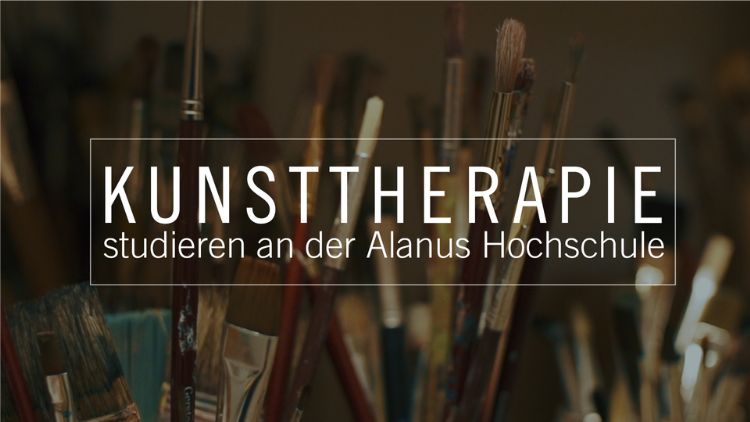
Art Therapy / Social Art
Bachelor of Arts / Part-Time
Art therapists and social artists structure therapeutic and social processes by means of practical artistic activity with individuals or groups and apply their competencies in projects, institutions or in their own practice. They employ painting, sculpture, graphics and also photographic and cinematic media as their means of expression. These form the special basis for art therapeutic approaches, diagnostics and the recording of medical histories.
Special Features
Integrative Approach
The programme is oriented towards the anthroposophical and complementary medical concept of the human being in dialogue with related artistic, medical psychological, psychotherapeutic and art-therapeutic approaches. It is committed to education for sustainable development in practice and research.
Intensive Support
E-learning and an audiovisual education platform provide guidance for the students during self-study phases, supplementing the intensive support available at the university.
Strong Relation to Practice
Transfer of therapeutic theory and class contents into practical fields of work takes place parallel to the standard curriculum and is professionally supported and supervised by the teaching staff and reflected upon in the team.
Cross-Medial Competence
is developed through online-based media such as film, sound clips, photography and digital art and expands the spectrum of methods available in art therapy.
Intercultural Approaches
are a focus of the training for work in the intercultural, transcultural field, the confrontation with “own” and "foreign" living environments and their distinctive social, ethical, political and cultural features.
Medicine, Psychology, Psychotherapy
Seminars on theory are translated into practical procedures in art therapy and social art. A direct connection with related medical and therapeutic disciplines is established and interprofessional communication is encouraged.
Research
Proven approaches and methods of research in art therapy are an integral component of course modules and prepare students to develop their own research questions for the Bachelor’s thesis.
Course Contents
The programme has an anthroposophical orientation and opens space to reflect upon learned content artistically and in scientific discourse in the context of related disciplines. It is comprised of 10-11 weekends plus 2 weeks of intensive attendance learning per year. It is divided into 4 main areas of study and the Bachelor’s thesis.
1. Fundamentals of Art
Painting, graphics, sculpture, photography, film and digital media as well as cross-media studies from drama and music therapy.
2. Fundamentals of Art Therapy
Recording of medical history, diagnosis and therapy methods, anthropological development, paediatrics, biography, medicine, physiology, pathology, psychology, psychiatry, occupational science and research in theory and practice.
3. Art Therapy in Practice
Self-awareness (100 hours) and basic knowledge of art therapy and social art in four fields of practice (500 hours):
- Art mediation
- Children and youth
- Adults and seniors
- Clinical internship
Additionally recommended:
- 360 hours internships (for professional and umbrella organisations)
- 30-50 hours of external self-awareness
These achievements are listed in the diploma supplement at the end of the course.
4. Studium Generale
The lectures and seminars of this supplementary cultural studies programme encourage students to reflect upon philosophical issues and thus find and form their own position in the social and cultural context.
Bachelor’s Thesis
The programme concludes with the writing of an academic thesis.
Video about the Degree Programme
Watch the video about our programme!

Mode of Study
- Reflected artistic practice
- Contemplation of works
- Lectures
- Seminars and exercises in small groups
- E-learning
- Colloquia
- Excursions
- Supervision, team consultation
- Internships
- Conferences, symposia, advanced training
Application Process
International degree-seeking students are asked to contact the General Student Advisory Service for the admission procedure. Please contact the person at this office who is responsible for the degree programme you are interested in.
Application Documents:
- Curriculum vitae
- Letter of Motivation
- Officially certified copies of school leaving certificates and degrees
- Certificate of registration from a German health insurance provider
- 2 passport photos
- Foreign applicants require proof of sufficient German language skills (TestDaF, DSH or an equivalent certificate)
Portfolio
For assessment of your artistic aptitude, please submit an art portfolio. The following requirements apply:
- At least 20 works that have been completed within the last 2 years
- Painting, drawing, sculpture, photography and video (photos and video should make up max. 25% of the portfolio)
- Maximum portfolio size A1
- Photographic documentation of large-format pictures, paintings/drawings on canvas and sculptures. Photo format 20x30cm. Three-dimensional works photographed from three sides.
- All works should be labelled on the back: applicant’s name, title of work, technique, size and date
- Portfolio should be organised by topic, technique or artistic development
- The portfolio may be collected at admissions weekend in June of the application year, at the Secretary’s Office, or returned by post (subject to a fee).
- Evaluation Criteria: Self-expression, originality and personal artistic themes. Range of artistic abilities, especially in painting and drawing. Dealing with pictorial elements (material and form). Attention to detail and thorough execution of pictures.
Admission Requirements
The Bachelor's Programme Art Therapy / Social Art is aimed at self-reflective practitioners – primarily from artistic, social and/or health-related occupational fields.
- General or subject-specific higher education entrance qualification (Abitur)
- Or completed vocational training with at least 3 years of professional experience, supplementary higher education entrance exam required
- 4-week social internship
- Successful participation in the university entrance exam
Career Prospects
The programme qualifies students for work in clinics, rehabilitation facilities, social work, intercultural contexts and in their own practice (admission as a non-medical practitioner for psychotherapy required).






